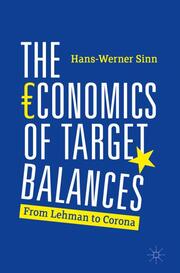-
Zusatztext
-
Target balances are the largest single item in some of the balance sheets of the Eurosystem's national central banks (NCBs), and yet very little is known about them by the general public and even by economists. This book shows that Target balances measure overdraft credits between the NCBs that resemble ordinary fiscal credit and which have grown disproportionately, exceeding one billion euros. There is, however, no parliamentary legitimation for the Target balances. The book sheds light on the economic significance of the balances, questions their limitlessness, and addresses controversial views that have been expressed regarding them. It uses the Target statistics to analyze the course of the euro crisis and the ECB's policy reactions from the time of the Lehman bankruptcy up to the outbreak of the Corona crisis. It analyses the credit risks involved for the Eurosystem and concludes with a reform proposal. This book will be of interest to non-specialist economists and policy makers.
-
-
Kurztext
-
"Though not initially expected or understood large movements in target balances at Eurozone Central Banks turned out to be a central essential feature of enabling the euro-system to survive a series of major shocks. In this beautifully and magisterially written book, Sinn describes clearly how this complex system has operated, and the several problems that this has entailed. An essential read for anyone interested in the workings of the euro-system."- Charles Goodhart, Emeritus Professor of Banking and Finance at the London School of Economics (LSE) "This excellent book, which deeply improves the understanding of the topic of Target balances, comes at a crucial moment in European history where due to the Corona-Crisis substantial reforms in the institutional organization of the Euro-Area and the EU will become necessary. It will help policy makers and academics when facing this enormous challenge. The book is rooted in theoretical economic principles and does not reflect a mere dogmatic or political view of the issue." - Frank Westermann, Professor of Economics and director of the Institute of Empirical Economic Research, Osnabrück University, Germany "This book is a must-read for anybody interested in the working and the problems of the eurosystem. The author analyses the developments which are reflected in a seemingly pure technical issue. Pervasive, stringent, just brilliant." - Otmar Issing, President of the Center for Financial Studies and former member of the ECB Executive Board (1998-2006)Target balances are the largest single item in some of the balance sheets of the Eurosystem's national central banks (NCBs), and yet very little is known about them by the general public and even by economists. This book shows that Target balances measure overdraft credits between the NCBs that resemble ordinary fiscal credit and which have grown disproportionately, exceeding one billion euros. There is, however, no parliamentary legitimation for the Target balances. The book sheds light on the economic significance of the balances, questions their limitlessness, and addresses controversial views that have been expressed regarding them. It uses the Target statistics to analyze the course of the euro crisis and the ECB's policy reactions from the time of the Lehman bankruptcy up to the outbreak of the Corona crisis. It analyses the credit risks involved for the Eurosystem and concludes with a reform proposal. This book will be of interest to non-specialist economists and policy makers.
-
-
Autorenportrait
- Hans-Werner Sinn is President emeritus at the ifo Institute for Economic Research and Professor emeritus at the University of Munich. He founded and directed the international CESifo research network and the Center for Economic Studies. He has received four honorary doctoral degrees, has delivered numerous distinguished academic lectures, has taught in a number of countries, and was both President of the International Institute of Public Finance (the world organization of Public Sector economists) and the German Economic Association (Verein für Socialpolitik). In recent years, his work has focused primarily on the euro, the financial crisis, the European Central Bank, green energy, demography, migration, and Brexit. He previously conducted extensive research into German reunification, taxation, systems competition, and insurance.
Detailansicht
The Economics of Target Balances
From Lehman to Corona
ISBN/EAN: 9783030501693
Umbreit-Nr.: 9226085
Sprache:
Englisch
Umfang: xiii, 146 S., 14 s/w Illustr., 146 p. 14 illus.
Format in cm:
Einband:
kartoniertes Buch
Erschienen am 24.10.2020
Auflage: 1/2021


